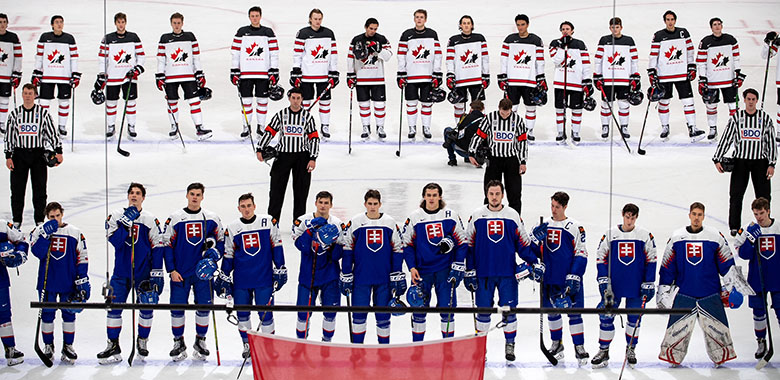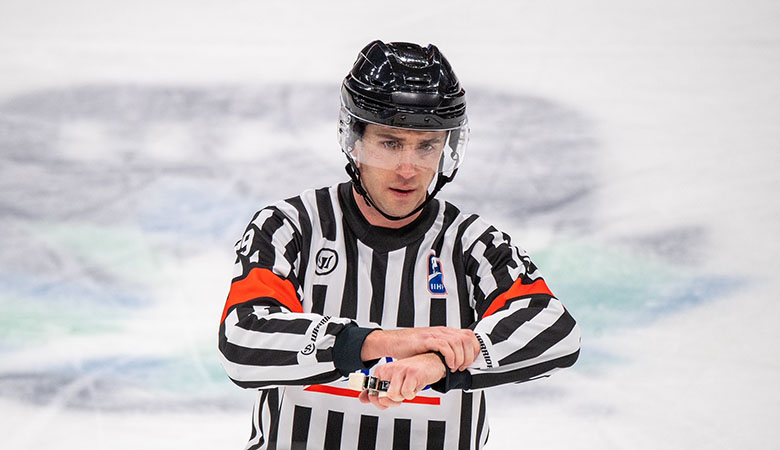If there’s a positive that came out of COVID-19, it’s the opportunity the pandemic led to for Mike Langin and 25 Canadian officials.
They got the assignment of being the officiating crew for the World Junior Championship in Edmonton-Red Deer.
Langin, a former Kootenay International Junior Hockey League official, worked his first International Ice Hockey Federation event as his Hockey Canada Level 6 certification qualified him to work such a high stage tournament.
“It was a pretty big honour to be part of the tournament,” says Langin, who worked four games, including the Sweden-Finland quarterfinal game. “It was awesome. We were treated very well and it was a very positive experience.
“It was something I wanted to do for a long time,” continued Langin, who was born in Red Deer, but lived in Sylvan Lake. “It was on my list of accomplishments. The opportunity to do it with good friends. It’s a pretty cool experience for sure.”
Langin, who works for Taylor Made Golf in Saskatoon as a territory sales and marketing manager, referees in the WHL, USports in Canada West and the SJHL. He also officiated in the American Hockey League from 2015-17. While at the WJC, Langin was in a bubble for three-and-a-half weeks with his officiating colleagues.
“How we came together as one big family and so quickly is something I will remember and cherish,” says Langin.

Photo by Matthew Murnaghan/Hockey Canada
The officials met together many times to go over things and share information. That made the experience phenomenal.
“I would really try to get as much intel from games as possible,” says Langin. “I was really leaning on other officials to find out who is easy to talk to on the bench. We could get a lot of game intel from being at the games or guys who worked previous games and learn as much as we could. Every game is so critical for these teams.”
The experience Langin gained from refereeing in the WJC is something he will give back to his local association and be a mentor to younger officials. Langin began officiating in the 2002-03 season and was a linesman in the KIJHL and worked in the league for eight years. He officiated in the Cyclone Taylor Cup and the Keystone Cup (the Western Canadian championship).
Working games in the KIJHL helped him become a confident referee.
“You really had to be in charge and it forced you to take control of the game,” says Langin, who thanked Jason Rende, the High Performance Officiating Coordinator-Interor for BC Hockey, for the opportunity given to him to work enough games to succeed.
Langin worked his first game as a linesman in Grand Forks and his first as a referee in Sicamous.
“It’s a really good stepping stone,” says Langin. “You want to be able to master the Junior B level before continuing onto the higher levels.”
Langin played hockey as a kid, but eventually quit because he didn’t like the commitment of early morning practices. He decided to start reffing and “it took a life on its own.”
“Being 15 and getting cheques for $200 was nice,” he says. “The friendships and relationships made in the game is pretty cool. Most of my really good friends are all because of hockey. It’s a nice brotherhood with the officials. It’s an escape from the real world. On the ice you are not worrying about other things, you are focused on the game. It’s a good experience and front row seats to good hockey.”
Among the things he enjoys about being a referee is the travel. He gets paid to do it and has been to many communities in B.C., Western Canada, the U.S. and went to Russia two years ago for the World University Games. Langin, who started working in the KIJHL after five years of officiating, would love to work more IIHF events.
His message for KIJHL players who might be considering becoming an official is there is more to hockey than playing. Officiating is a good avenue to stay involved.
“Give it a shot. You may go out there and hate it or love it,” says the 31-year-old, who is also thankful to former KIJHL president Bill Ohlhausen who supported the officials well. “You won’t know until you try it. There are lots of opportunities and good programs. BC Hockey operates a very well run program and you can get noticed at many levels. Go back and work minor hockey and make friendships. It’s a good way to start for sure.”


























